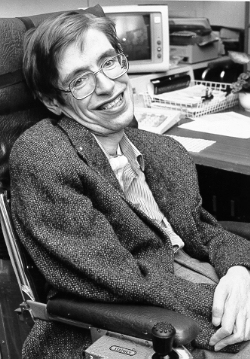
Physicist Stephen Hawking died on March 14, aged 76, bringing to a close a remarkable life of resilience and achievement. The British cosmologist was celebrated for his academic brilliance and a lifelong drive to communicate these ideas to a wide audience, becoming a pop culture icon.
Diagnosed with motor neuron disease while completing his PhD at Cambridge in 1963, Hawking was told he barely had time to finish his thesis. Instead, he lived with the severely degenerative illness for over fifty years, married, and had children. Publishing numerous papers, Hawking became the Lucasian Professor of Mathematics at Cambridge — a position once held by Isaac Newton — and authored several books, among them A Brief History of Time. It has sold more than ten million copies, defining the wildly successful genre of popular physics literature.
Appearing regularly in his powered chair, both at home — where he was notorious for daredevil speeding round Cambridge quads — and lecturing worldwide, Hawking spoke via his now instantly recognizable computer-synthesized voice. Guest-starring in The Simpsons, Star Trek: The Next Generation, and The Big Bang Theory, he was known for a wicked sense of humor and love of the limelight — culminating in the 2014 movie The Theory of Everything covering his early academic life.
Among his contributions to theoretical cosmology are insights into the singularity from which the universe sprang, and the radiation bearing his name, by which a black hole may eventually evaporate. His combination of quantum theory with general relativity established the field of black hole thermodynamics, which remains a subject of debate today.
There is little doubt Professor Hawking’s name and work will universally live on to a time when his theories can be confirmed, continuing to inspire physicists, be they academic or amateur, for generations to come.

